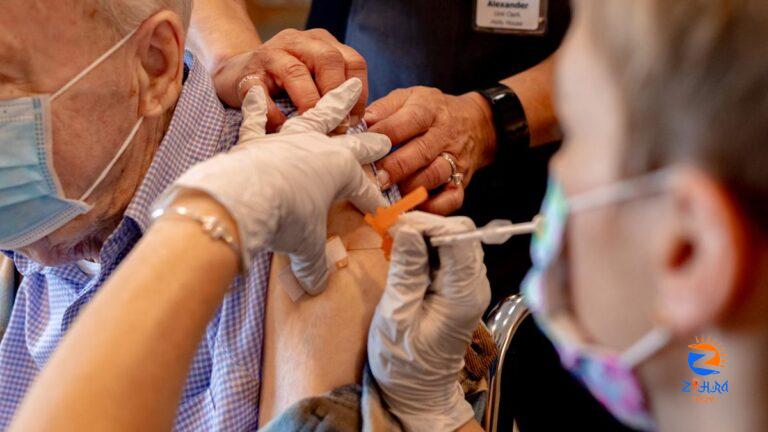
[ad_1]
WASHINGTON — A key federal advisory panel voted overwhelmingly on Friday afternoon not to recommend booster shots for every American 16 or older who has already been vaccinated against the coronavirus, only to vote minutes later — even more overwhelmingly — to approve boosters for people 65 and older, as well as those at high risk because of preexisting conditions or occupational hazards.
Next week another panel, this one from the Centers for Disease Control and Prevention, also has to grant approval. If it does, the Biden administration can begin this next stage of the vaccination effort. Since last December, 180 million Americans have been fully immunized against COVID-19, which has killed 671,000 people in the United States since the pandemic began in late 2019.
The vote by the Food and Drug Administration’s Vaccines and Related Biological Products Advisory Committee in favor of vaccinating older people was unanimous, and was later amended to include individuals with “occupational exposure,” such as health care workers and teachers. The FDA is not bound by the recommendation, although it is unlikely to reject the panel’s advice outright.
“The FDA Advisory committee made the right recommendation today,” tweeted Dr. Vin Gupta, a health policy expert at the University of Washington.
The White House, which had hoped for full approval but needed to avoid full rejection, did not respond to a Yahoo News request for comment. Still, the vote amounted to a victory — if only a partial one — for the Biden administration, which had initially planned to offer boosters as early as next week. Since the plan had always been to begin administering boosters to older and more vulnerable people first, the lack of approval for a younger, less vulnerable population may not make a difference in the short run, especially since millions of younger people have not been vaccinated at all.
The first vote of the FDA panel had 16 of its 18 outside advisers voting against a new round of vaccinations for all recipients of the Pfizer vaccine who are 16 or older.
The vaccine uses a technology called messenger RNA, or mRNA. Pfizer’s vaccine is the only one that has full FDA approval; it also shows more significant deterioration of efficacy than the mRNA vaccine produced by Moderna. Data on the single-dose Johnson & Johnson vaccine, which uses an older technology that requires only a single dose, has so far not indicated a need for booster shots.
“I’d like to see more data before I would recommend it for a younger age group, but over 60 is probably OK from my standpoint,” said Dr. Archana Chatterjee, one of the FDA panelists who voted against the broader booster plan.
The World Health Organization has strongly recommended against booster shots, arguing that it is imperative for nations like the United States to help vaccinate the developing world instead of bolstering protection for its own citizens. FDA officials did not focus on such questions, which the Biden administration has also played down, calling the tension between international cooperation and home-front imperatives a “false choice.”
Instead, the only question before the panel on Friday was whether boosters were scientifically justifiable. To determine whether that was the case, the panelists heard from a bevy of scientists and public health officials, including from Israel and Britain. Those nations both experienced a Delta surge earlier than the United States.
Israel is the world’s most vaccinated nation, but by the time the Delta variant arrived, immunity in the country had started to wane, and infection rates rose sharply. “We definitely feel the booster effect, but were not over the fourth wave yet,” Dr. Sharon Alroy-Preis, a top Israeli public health official, told the panelists.
Pfizer’s own experts cited a marked increase in antibodies after a third shot, as well as a lack of adverse side effects, as a reason to grant approval. “The time to restore protection with a safe and effective dose of BNT162b2 is now,” said Dr. Bill Gruber, a Pfizer vice president, using the scientific name for the company’s vaccine.
The United States is now in the midst of a Delta wave of its own, one that could worsen as the weather grows cold again and children return to school. Some Americans are now eight months from having been fully vaccinated, which is at the point when protection against the coronavirus begins to wane. Some have simply gotten a booster on their own, without waiting for sanction or approval.
The booster debate has grown increasingly heated in recent days, as the Biden administration pushed for third shots, only to have some scientists in the federal biomedical establishment push back. Among them were two FDA scientists who said they were resigning in protest, citing political pressures on the scientific process.
Both of the scientists, Drs. Marion Gruber and Phil Krause, attended Friday’s meeting. Krause questioned Bill Gruber, the Pfizer doctor, arguing that the vaccine’s efficacy was higher than company trials had suggested, obviating the need for universal boosters.
After the first vote failed, the FDA called for a second, this time focused only on people 65 and older, as well as those who have medical conditions that could lead to severe illness. The vote was more successful this time around, with all 18 panelists voting in favor of approving boosters for this narrower group. They then proceeded to add workplace hazards as a reason for boosters. Such hazards exist in schools, hospitals and other settings, potentially making millions of Americans who are neither elderly nor otherwise vulnerable eligible for a booster shot.
The approval was granted on an emergency basis.
“I am really glad that we authorized this vaccine for a third dose,” said Dr. Jay Portnoy, an immunologist at Children’s Mercy Kansas City after the vote, “and I plan to go out and get my third vaccine this afternoon.”
____
Read more from Yahoo News:
[ad_2]